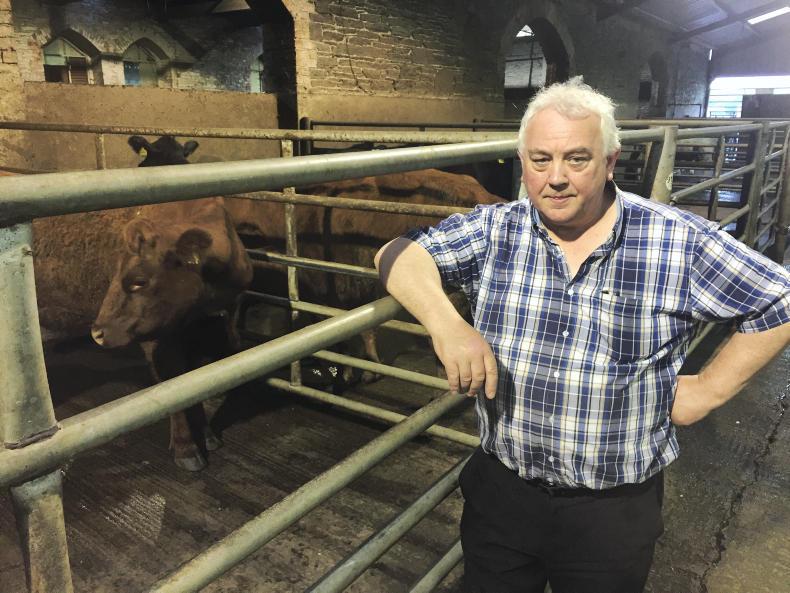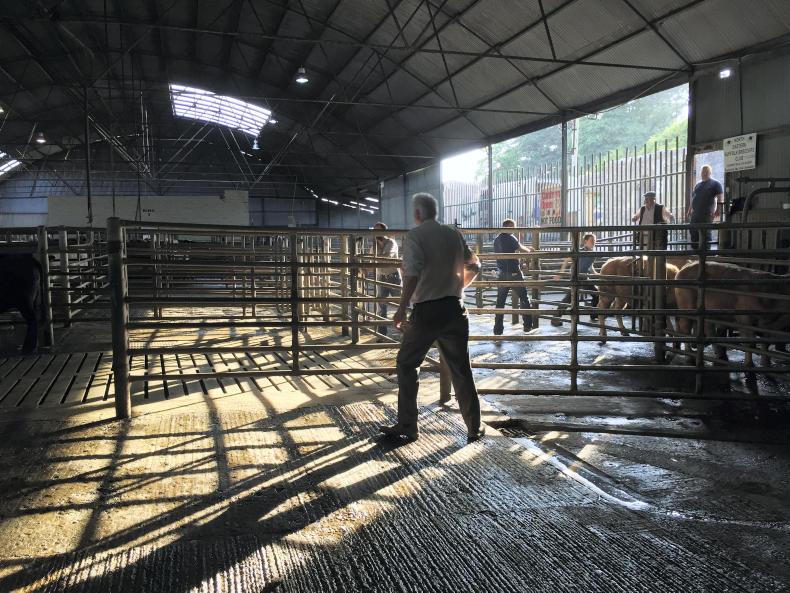“It will go the way it goes and it won’t make much change for me,” a Monaghan suckler farmer said, reflecting the view of most buyers and sellers the Irish Farmers Journal asked about Brexit on the night.
 Suckler and dairy farmer Ciaran McCaffrey from Scotstown, Co Monaghan, and Cootehill beef farmer Kenny Pepper (pictured) think it will not actually happen.
Suckler and dairy farmer Ciaran McCaffrey from Scotstown, Co Monaghan, and Cootehill beef farmer Kenny Pepper (pictured) think it will not actually happen.
“It will be reversed in another election,” said Ciaran. “There’s too much at stake, it’s unworkable,” added Kenny. They agreed that the massive cost of erecting a new border would make decision-makers think twice.
It’s a scaremongering tactic by the factories
Ciaran added that the warnings about Brexit were “a scaremongering tactic by the factories” and said he was most worried about exchange rate fluctuations while uncertainty remains.
“It’s a lot of hype,” said a Co Cavan pig and suckler farmer, adding that the search for alternative markets to the UK represented “jobs for the boys in Bord Bia, the IFA and the Department – organisations that are not representing farmers like me”.
While promises of beef exports to the US are slow to materialise, he added that “Birmingham is 3m people and it will always be a couple hours down the motorway and across on the ferry”.
’Best thing’ for Ireland
 Cattle agent John McNally argued that the UK’s decision to leave the EU was “the best thing that happened for Ireland”.
Cattle agent John McNally argued that the UK’s decision to leave the EU was “the best thing that happened for Ireland”.
Although he expects a difficult period in the immediate aftermath of Brexit, he said: “The UK is less and less self-reliant and they will buy more and more from Ireland. Transportation costs, etc, play for us.”
John believes emerging countries, such as China and Indonesia, will absorb much of cheaper agricultural producers like Brazil and Australia.
Dairy farmers met in the border area trust their co-ops to manage the Brexit transition. LacPatrick supplier Patrick Shalvey said the milk from his farm in Cootehill was separated in the Republic, with a large part going to Northern Ireland for further processing. “That co-op is set up so that it has good facilities on both sides,” he said.
Part-time jobs at risk
Lakeland supplier Stephen McGurk from Doohamlet, Co Monaghan, is aware of the potential challenge to his co-op from tariffs on cross-border milk trade, especially for winter supplies, which largely come from Northern Ireland. But he said Lakeland would “hopefully” manage it. “It won’t affect us,” he added.

Yet Stephen also said that the deteriorating exchange rate had forced him to leave his part-time job as lorry driver for a livestock haulier at the start of this year.
“When it dropped that far, it wasn’t worth my while going there anymore,” he said, acknowledging worries in his area about livestock prices.
A suckler farmer based 10 miles from the border said he too was worried about his part-time driving job for Lakeland’s feed mills.
“I’m afraid of the delays and complications. Some days I could be going over and back twice, others not at all,” he said.
Read more
Full coverage: Brexit annivresary
NI machinery dealer ‘will move south’ if hard Brexit
Brexit farm payments uncertainty reaches beyond NI
‘Move the border to the Irish sea’ – NI farmer and campaigner
Full coverage: Brexit
“It will go the way it goes and it won’t make much change for me,” a Monaghan suckler farmer said, reflecting the view of most buyers and sellers the Irish Farmers Journal asked about Brexit on the night.
 Suckler and dairy farmer Ciaran McCaffrey from Scotstown, Co Monaghan, and Cootehill beef farmer Kenny Pepper (pictured) think it will not actually happen.
Suckler and dairy farmer Ciaran McCaffrey from Scotstown, Co Monaghan, and Cootehill beef farmer Kenny Pepper (pictured) think it will not actually happen.
“It will be reversed in another election,” said Ciaran. “There’s too much at stake, it’s unworkable,” added Kenny. They agreed that the massive cost of erecting a new border would make decision-makers think twice.
It’s a scaremongering tactic by the factories
Ciaran added that the warnings about Brexit were “a scaremongering tactic by the factories” and said he was most worried about exchange rate fluctuations while uncertainty remains.
“It’s a lot of hype,” said a Co Cavan pig and suckler farmer, adding that the search for alternative markets to the UK represented “jobs for the boys in Bord Bia, the IFA and the Department – organisations that are not representing farmers like me”.
While promises of beef exports to the US are slow to materialise, he added that “Birmingham is 3m people and it will always be a couple hours down the motorway and across on the ferry”.
’Best thing’ for Ireland
 Cattle agent John McNally argued that the UK’s decision to leave the EU was “the best thing that happened for Ireland”.
Cattle agent John McNally argued that the UK’s decision to leave the EU was “the best thing that happened for Ireland”.
Although he expects a difficult period in the immediate aftermath of Brexit, he said: “The UK is less and less self-reliant and they will buy more and more from Ireland. Transportation costs, etc, play for us.”
John believes emerging countries, such as China and Indonesia, will absorb much of cheaper agricultural producers like Brazil and Australia.
Dairy farmers met in the border area trust their co-ops to manage the Brexit transition. LacPatrick supplier Patrick Shalvey said the milk from his farm in Cootehill was separated in the Republic, with a large part going to Northern Ireland for further processing. “That co-op is set up so that it has good facilities on both sides,” he said.
Part-time jobs at risk
Lakeland supplier Stephen McGurk from Doohamlet, Co Monaghan, is aware of the potential challenge to his co-op from tariffs on cross-border milk trade, especially for winter supplies, which largely come from Northern Ireland. But he said Lakeland would “hopefully” manage it. “It won’t affect us,” he added.

Yet Stephen also said that the deteriorating exchange rate had forced him to leave his part-time job as lorry driver for a livestock haulier at the start of this year.
“When it dropped that far, it wasn’t worth my while going there anymore,” he said, acknowledging worries in his area about livestock prices.
A suckler farmer based 10 miles from the border said he too was worried about his part-time driving job for Lakeland’s feed mills.
“I’m afraid of the delays and complications. Some days I could be going over and back twice, others not at all,” he said.
Read more
Full coverage: Brexit annivresary
NI machinery dealer ‘will move south’ if hard Brexit
Brexit farm payments uncertainty reaches beyond NI
‘Move the border to the Irish sea’ – NI farmer and campaigner
Full coverage: Brexit
 Suckler and dairy farmer Ciaran McCaffrey from Scotstown, Co Monaghan, and Cootehill beef farmer Kenny Pepper (pictured) think it will not actually happen.
Suckler and dairy farmer Ciaran McCaffrey from Scotstown, Co Monaghan, and Cootehill beef farmer Kenny Pepper (pictured) think it will not actually happen.  Cattle agent John McNally argued that the UK’s decision to leave the EU was “the best thing that happened for Ireland”.
Cattle agent John McNally argued that the UK’s decision to leave the EU was “the best thing that happened for Ireland”. 






 This is a subscriber-only article
This is a subscriber-only article













SHARING OPTIONS: